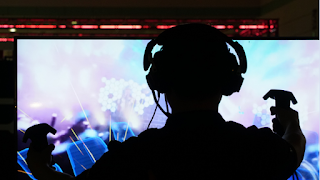 |
| A normal video game simulator |
Till now, you probably have heard of weird sci-fi theories about this space, the universe, black holes, subatomic particles, etc etc. But the theory with which we’re here today is something that challenges the entire reality! So continue only if you’re ready to blow your mind! The simulation theory or the theory of the virtual universe is a theory which not only questions human existence but it completely changes our views about the reality of this universe. It’s not that complex, but it just says that we human beings are just like the NPC’s (non-playing character) of a game, and to be more accurate we’re all ‘Sims’!
Let’s get a little deeper!
Since the beginning of human enlightenment, this theory was one of the most debated topics and even now, it’s among the serious topics of investigations among physicists, astrophysicists, and philosophers. Brilliant individuals like Sam Altman, Elon Musk, Neil deGrasse Tyson have discussed this theory in public too.
A simple explanation that can be used to validate it is the way our modern-day virtual reality programs are developing. It was just a decade before we were playing open-world games like grand theft auto(1997) with certainly low visuals and fewer features, but the latest version of it(grand theft auto 5) released in 2013 was way more advanced, with limitless possibilities and highly detailed visuals. From ‘Pong’ with two rectangles and a dot till today to photorealistic 3D games with millions playing simultaneously, it all changed in 40 years. If you assume any rate of improvement at all, then the games will become indistinguishable from reality, even if that rate of advancement drops by 1,000 from what it is now. It’s a given that we’re clearly on a trajectory that we’re going to have games that are indistinguishable from reality. It would seem to follow that the odds that we’re in base reality is 1 in billions. If not for entertainment purposes, but with human-like NPC’s in it, it could be used to study ancestral behaviors as well as evolution too! Some other logical explanations are:
The Mandela Effect
Some people claim to remember TV coverage of Nelson Mandela’s death in the 1980s even though he died in 2013. The “Mandela Effect” is therefore supposedly proof that whoever is in charge of our simulation is changing the past. (Or alternately, this is evidence of parallel universes and some individuals have crossed from one universe, in which Mandela died in the ’80s, into ours, where he lived to age 95.) Additional examples of this phenomenon include some remembering the name of the Berenstain Bears children’s-book series being spelled as “Berentstein” and others recalling a nonexistent movie from the 1990s called Shazaam, starring the comedian Sinbad as a genie.
Missing Aliens
We’ve spent billions sending probes through outer space and should probably have found evidence of extraterrestrials by now, right? Not so fast: Aliens would likely be far more technologically advanced than we are, the thinking goes, so the fact that we haven’t located them suggests we live in a simulation they’ve figured out how to escape from. Or maybe the computer we’re in only has enough RAM to simulate one planetary civilization at a time.
Electrons That Can’t Make Up Their Minds
In physics’ famous double-slit experiment, electrons are fired at a photosensitive screen through slits in a copper plate, usually producing an interference pattern that indicates wavelike behavior. But when the same experiment is conducted under observation, electrons behave like particles, not waves, and there’s no interference pattern. Some have taken this to mean our simulation is conserving its resources and rendering certain things only when it knows we’re looking at them.
DNA That Contains a Computer Virus
In 2017, a multidisciplinary group of researchers at the University of Washington proved that they could embed malicious computer code into physical strands of DNA. They aimed to show that computers working in gene sequencing were vulnerable to attack. But they may also have inadvertently revealed that what we perceive to be biological reality was in fact computer code all along.
Climate Change? How Convenient
Our civilization is (just coincidentally?) set on the cusp of environmental chaos, suggesting we could be an ancestor simulation created in hopes that we’d show our creators how to solve an energy crisis. This theory overlaps slightly with the aliens-as-simulation-quitters theory above: if we found an innovative solution to the climate crisis, extraterrestrial beings might return to crib the results.
Quarks With Computer Code
Seemingly not crazy theoretical physicist James Gates claims he has identified what appears to be actual computer code embedded in the equations of string theory that describe the fundamental particles of our universe. He says he found “error-correcting codes — they’re what make [web] browsers work. So why were they in the equation I was studying about quarks and electrons and supersymmetry?”
Why Does Our Universe Have “Rules” in the First Place?
MIT cosmologist Max Tegmark has pointed to our universe’s strict laws of physics as possible evidence that we live in a video game: “If I were a character in a computer game, I would also discover eventually that the rules seemed completely rigid and mathematical.” In this theory, the speed of light — the fastest rate at which any particle can travel — represents the speed limit for transmitting information within the network of our simulation.
It’s Not Possible to Prove We’re Not Living in a Simulation
It may be easier to prove that we’re living in a simulation than to prove we’re not. Nuclear physicist Zohreh Davoudi believes that cosmic rays — the most energetic particles known to man — would appear as pixel-like chunks if we are within a simulation, and unending beams if we’re in base reality. Meanwhile, NYU philosopher David Chalmers doubts it’s possible to prove that we don’t live in the Matrix: “You’re not going to get proof that we’re not in a simulation, because any evidence that we get could be simulated.”
Ghosts make more sense now
Paranormal events are not hauntings or alien encounters, but glitches in the simulation. This theory is the one most explored on Reddit forums like r/Are We Living in a Simulation and r/Glitch in the Matrix, where users explore big ideas in philosophy funneled into the details of the odd or the occult. A storefront exists in a town one day, then it doesn’t; explanations include a slip between parallel timelines or a pop-up. A car passenger sees the word “render” in the sky as if entering a new part of a video game. Elevators are a frequent setting for glitch stories; the jump between floors seems to encourage a slip within dimensions.
The “Bricks” of Our simulation universe!
According to simulation believers, we may have already found the pixel-sized building block of the universe: the Planck-length, the point at which our concepts of gravity and spacetime no longer apply. If our world is simulated, the Planck length would be equivalent to one bit of information, or a pixel.
Yanny vs. Laurel
Remember in 2015, when the world flipped out because we all looked at the same photo and some of us saw a blue dress, while others saw a gold dress? Or the Yanny/Laurel fiasco of 2018? (There was also the less explosive blue-gold-white flip-flop debate of 2016.) Say what you will about pitch and volume and color saturation, these controversies made one thing clear: Each of us lives in our world. No, really. What we perceive as reality is partly a simulation created by our brains (using our past experiences) to help us process the fragments of data that we’re receiving. To put it another way: There is no spoon
The ancient philosophy of Maya
Advaita Vedānta is a classic system of spiritual realization in Indian tradition. The term Advaita refers to the idea that Brahman alone is ultimately real, the phenomenal transient world is an illusory appearance (Maya) of Brahman, and the true self, atman, is not different from Brahman.
Universal intelligence



0 Comments
Please post your views